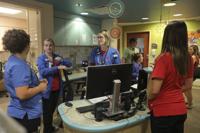CHESTERFIELD — For a 150-year-old St. Louis hospital system, the answer to staffing shortages may be a labor model popularized by Silicon Valley startups.
Since late last year, Chesterfield-based Mercy has been piloting a program in Springfield where both staff nurses and “gig worker” nurses can sign up for shifts through an app. Now the health system is expanding it across all of Mercy.
“Millennials, and those even younger, are starting to look at work in a different way,” said Senior Vice President and Chief Nursing Officer Betty Jo Rocchio. “They probably were earlier, and we missed the signs, in nursing.”
The pandemic has compounded staffing shortages in health care, and in the past two years hospitals have increasingly relied on short-term contractors, known as travel nurses. Many staff nurses left their permanent positions at hospitals for the traveling jobs, in favor of more pay and flexibility.
But the shift in the industry also left hospitals realizing they couldn’t pay the travel wages forever. And nurses began to realize they could have much more control over when and how much they worked, Rocchio said.
“We’ve been listening,” Rocchio said. “And we finally have something, I think, that is going to help.”
The program has its trade-offs. Mercy’s gig workers don’t get benefits or paid time off. They can’t work more than 30 hours a week, and they aren’t guaranteed shifts. But for some, the power to choose their schedule is attractive enough.
Some need control over their hours because they are a caregiver for a family member, said Tiana Gasior, Mercy’s St. Louis and east regional float pool manager. Some have a spouse in the military. Some are close to retirement and want to work fewer hours, but aren’t ready to stop altogether.
The Mercy program is not the first short-term staffing program adopted by area hospitals. In 2020, SSM Health started using CareRev, a platform that allows prequalified health care workers to pick up shifts. SSM now has over 600 workers on the platform. Most of them have separate full-time jobs, and pick up shifts at SSM when they can, said Grady Brimley, the health system’s vice president of transformation.
Brimley said the program “definitely has its place.” Still, hospitals need long-term, core staff. Permanent staffing is a better model, not least because it offers people benefits and guaranteed hours, he said. But hospitals also have to be efficient, and having an on-demand workforce allows them to flex up and down more easily when patient numbers rise and fall.
‘We’re filling our shifts’
Hospitals have long complained of staffing shortages, but the situation grew increasingly dire during the pandemic. As health care workers took on more work, risk and trauma, often without much more pay, many left their staff positions to work as travel nurses, which paid as much as three times more, or left hospitals altogether.
Karla VanHorn, a nurse manager at Mercy Hospital Springfield, said that during surges of the virus, patient numbers rose faster than the hospital could hire and train new staff. The 25-bed neuro trauma intensive care unit where she works, normally staffed by about a dozen nurses, was sometimes short by three to five.
VanHorn said her unit first started using the app, “Mercy Works on Demand,” for staffers who had wanted a faster, easier way to pick up extra shifts. In the past, nurses could look for shifts online, but they’d see hundreds available across the whole hospital, many of them in areas they couldn’t work. The app, on the other hand, only shows people shifts available in their own unit or other units they are qualified to work in.
On Sundays, VanHorn used to spend a couple of hours looking at the week ahead, and telling staff which days would be short-staffed. She said she hated doing it, because she knew people felt guilty when they turned shifts down.
“So this relieves that guilt,” VanHorn said. “They can pick it up, or they don’t pick it up. I don’t have to say, ‘We’re short.’”
Then the hospital added another group — the gig workers. Those nurses fill out normal job applications, go through interviews, and then are hired and receive an orientation. During their first couple of shifts they are paired with an instructor.
Electronic medical records, common equipment like IV pumps and other supplies are standardized across Mercy, Rocchio said, which makes it easier for nurses to work in different units and different hospitals.
“They are Mercy nurses,” Rocchio said. “They are hired by us, into this flexible workforce … they just can pick up the hours that suit them.”
Full-time staff still get first dibs on open shifts, two weeks ahead of time. Then one week out, Mercy opens up the remaining shifts to the gig workers. The gig workers must take at least four hours in a 90-day period to stay in the program, and can work up to 30 hours per week.
“We’re fully staffed, on these units,” Rocchio said. “We’re filling our shifts at anywhere from 95% to 100% of the time.”
‘Everybody wants flexible work’
Valerie Frohwein, 37, of Republic, Missouri, near Springfield, learned about Mercy Hospital Springfield’s gig worker program a few months ago, and decided to start picking up shifts.
Frohwein had worked as a pediatric nurse at the hospital previously. But for the past year she’s been working as a school nurse at her daughter’s elementary school, so that they could have similar schedules.
Working in the pediatric floor at Mercy helps her keep up her skills caring for patients in an inpatient setting, which she may want to do full time again when her daughter is older. And as a gig worker she can take shorter shifts, of eight or even four hours, instead of 12.
“That’s really nice — and not common,” she said. “You have a lot of flexibility, and the pay is still really good.”
Rhonda Philpott is on staff at the Springfield ICU where the program was piloted, as a clinical supervisor, and said the app made it easier for her to pick up extra shifts. But beyond that, her unit, which in the past sometimes had 30% vacancy, is no longer short-staffed.
“It always feels good to be able to come into a fully staffed unit,” she said.
Most of the gig workers who’ve started recently are people who worked at the hospital and left for travel nurse jobs, she said. To create an option that’s like a travel position, with the flexibility people had sought, Philpott said, was “very smart.”
So far the program has attracted parents, nurses who are studying to get another degree, and people who have a full-time job as a nurse at a school, clinic or another hospital and want to pick up extra hours.
In late January, Mercy expanded the pilot from one unit to four at the Springfield hospital, plus the emergency department. In late April, it opened for nurses in Joplin, Carthage, Aurora, Cassville, Lebanon and Mountain View. On Tuesday it will go live across Mercy’s entire four-state system.
Night shifts have historically been less popular, in part because they are often the most short-staffed. But Rocchio said nurses are more willing to take them on, now, because they know the shifts are more likely to be filled and staff less stretched.
“There are plans to go outside of nursing with this,” Rocchio said. “Because everybody wants flexible work. … But the nursing workforce is suffering the most, so we started there.”









